

Anchi Poruno
Japan 2016
Genre:
Drama
Director:
Sion Sono
Cast:
Ami Tomite
Mariko Tsutsui
Fujiko
Ami Fukuda
Yuya Takayama
Dai Hasegawa

Antiporno
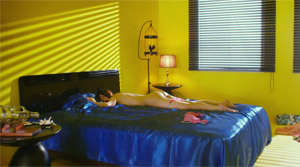
Story: Kyoko (Ami Tomite) is a famous artist. First, she draws the protagonists of her novels on canvas, then she writes the book and
eventually presents her drawings in an exhibition. She lives alone in a big apartment and speaks with her deceased sister. Her agent Noriko (Mariko Tsutsui)
informs her about the schedule that day. But Kyoko is tormented by self-doubt and inner demons. She unloads her anger directed at the world in general on
Noriko, who willingly submits to the artist's dominance. When the women of the lifestyle magazine, who want to interview Kyoko, turn up the artist continues
humiliating her agent. Suddenly, a director shouts "Cut" and Kyoko turns out to be an actress who gets bullied by her colleagues. It seems that Kyoko's
portrayal is a reflection of what she had to experience herself. The scene is shot again and again, but this time there is no film crew. Is this Kyoko's true
life after all? Furthermore, the young woman constantly finds herself thrown back into her adolscence in which her parents preached to her that sex is
obnoxious and bad. This has coined Kyoko's life until today and is part of her mental problems.





Review: When director Sion Sono shoots a porno movie this should definitely turn out differently than what you would normally expect
from a movie like this. Especially, when it is a work commissioned by Nikkatsu which wants to revive its Roman Porno (Romantic Porno) label. Particularly
in the 70s and 80s this label had to offer movies of a high artistic level since young directors had a comparatively free hand in how to shot their movies,
their eagerness to experiment only being trimmed by the fact that a certain amount of sex scenes had to be seen. Therefore, it shouldn't come as a surprise
that directors like Yojiro Takita started with movies like these, too, who later even won an Oscar with his "Departures". Sion
Sono doesn't pass on the opportunity to deliver an interesting art house work.
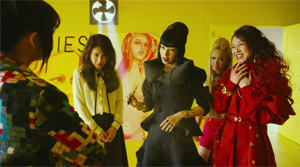
Fans of the director should know that he is especially fond of the female body. In his movies you oftentimes get the impression that he sees women
merely as sex objects. But at the latest with his horror thriller "Tag" the filmmaker has shown that he has been misunderstood
by critics. Thus, he made fun of his own tendency to voyeurism. So, should it really be a surprise that "Antiporno" is a strikingly feminist glance at the
world? Apart from that Sion Sono also presents an extremely sophisticated story, which works on several meta levels and leaves a lot of room for interpretation.
No doubt, this is artistic cinema. At times almost the kind of art you see in repertory cinema, but the director's handwriting still remains visible
all throughout, which the movie benefits from.
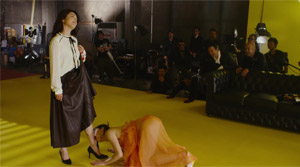
After the first few minutes I had some concerns that the director would once again deliver the kind of lengthy artsy cinema, which
"The Whispering Star" already was. But there is in fact a lot to see and reflect about here. Kyoko's play with
dominance and her aggressive nature may be the result of a queer attitude towards sex since her parents have always told her that sex is something dirty,
while rolling in bed full of lust and desire. There probably is raping involved here, too, and then there is the trauma concerning Kyoko's deceased sister.
Why did this talented girl have to die while Kyoko was allowed to continue living? Kyoko is full of self-doubt and conceals this in different ways, resp.
she uses art as an outlet for her many issues. But after half an hour all we have seen turns out to be a movie.

The director isn't content with Kyoko's performance and the roles of her and Noriko are reversed. Has Kyoko only mirrored other characters? Or is everything
actually just happening in her head? The lines between fantasy and reality become blurry in a sea of surreal pictures, especially when flashbacks start to
occur and Kyoko later on is desperately looking for the film crew in her life, but things turn out to be just her life. Is Kyoko simply mad? The play with
colors and light leaves no doubt that this is art and the acting underlines this even more. Ami Tomite and particularly Mariko Tsutsui manage to deliver
great performances in their at times pretty long scenes in which they have to switch between their characters, too. However, Ami Tomite sometimes maybe
plays her part a bit too much taylored at an art house audience. But then again maybe she does so as Kyoko for the film crew within the movie. Yes,
"Antiporno" is a weird movie.

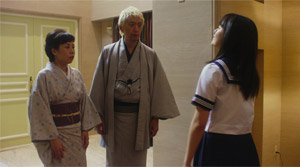
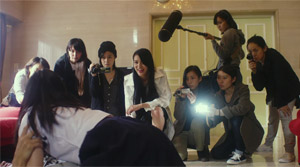

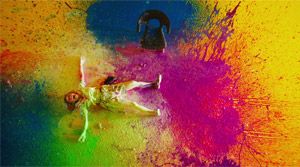
Then there are also the several dialogues revolving around the role of women and their liberties which actually aren't any. In this respect it needs to be noted that the role of women in Japan may be more modern these days than in the past, but that it is still rather traditional. Sion Sono clearly adresses this through his characters, depicts the voyeuristic aspect of the movie medium and to top this he also lets Kyoko appear on a theater stage. Of course, there are also a few sex scenes, but they never remind you of a porno, instead they are clearly shot for an art house drama, which "Antiporno" is after all. You will be surprised how much material can be found in the picture despite its meager 75 running time. At first, I was sceptical, but there is a lot to discover and decipher in "Antiporno". Yet, you shouldn't completely dislike art house cinema, because even if you won't be outright bored here, you still need the will to interpret things in order to fully appreciate the movie.

Disclaimer










